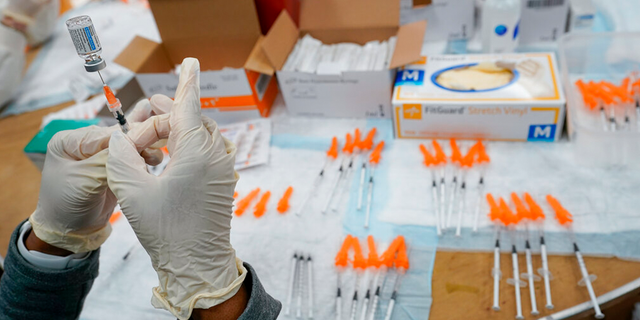Johnson & Johnson vaccine less effective against Delta variant: study

Ex-FDA chief sounds alarm on Delta variant: ‘Could be the most serious virus of their lifetime’
Dr. Marty Makary of Johns Hopkins School of Public Health joins ‘Fox & Friends First’ to explain the Delta strain of coronavirus
A recent study from researchers at New York University found that the Johnson & Johnson vaccine may be less effective in battling COVID-19 variants than vaccines made by Pfizer-BioNTech or Moderna.
The results of the study were published by bioRxiv and have been submitted to a peer-reviewed journal.

A registered nurse fills a syringe with the Johnson & Johnson COVID-19 vaccine at a pop up vaccination site in the Staten Island borough of New York.
(AP)
According to the study, the mRNA-based vaccines Pfizer and Moderna were 94 to 95% effective in preventing COVID-19 whereas the “adenoviral vector-based” Johnson & Johnson had a roughly 67% effective rate.
The study was led by Nathaniel Landau, a virologist at New York University’s Grossman School of Medicine.
Landau told Fox News that the aim of the study “was to determine how well the antibodies that are raised by the 3 approved vaccines neutralize the variants of concern.”
“The results show that … all three vaccines raise antibodies against the variants,” Landau said. “The vaccines that have two shots (Moderna and Pfizer) raised better antibodies than J&J. All three vaccines are good. J&J might be even better if a second shot were added.”
In a statement provided to Fox News, Johnson & Johnson cited previous studies which showed that a single-shot of its COVID-19 vaccine was 85% vaccine “at protecting against severe disease and provided complete protection against hospitalization and death.”
The company said Landau’s study did not speak to the full nature of immune protection. It cited additional company data demonstrating that a Johnson & Johnson single-shot COVID-19 vaccine “generated strong, persistent activity against the rapidly spreading Delta variant and other highly prevalent SARS-CoV-2 viral variants.”
Source: Read Full Article


